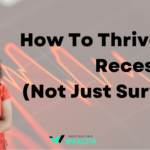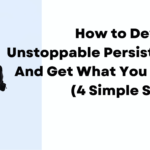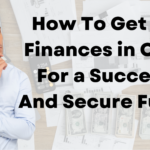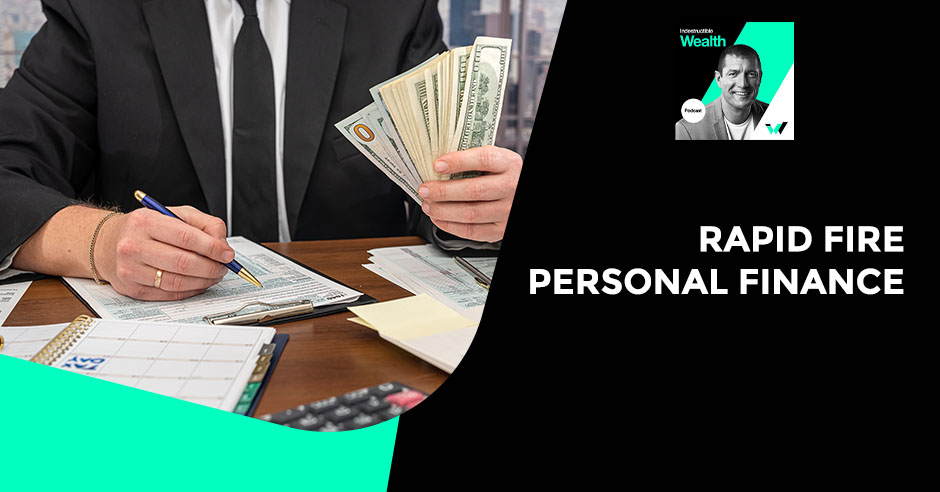
Today, Jack Gibson does a rapid-fire round on personal finance. Credit card or debit card? Which one would you go with? A quick listen with important direction.
—
Listen to the podcast here
Rapid Fire Personal Finance
In this episode, we’re going to do a Rapid-fire round on personal finance. This isn’t investing. These are things that my beliefs and philosophies formed over the years, looking at how this has played out for me. Some of these go against the traditional grain of advice. As you can expect, I’m an alternative finance and investor. I’m going to lay out the pros and cons, and some of these as well. We’re not going to do a deep dive into any of these. I’m just going to give you guys a bird’s eye view of these concepts.
Credit card or debit card? Which one would you go with? In everything in finance investing, the answer is it depends. Overall, I’m a huge fan of credit cards for a couple of reasons, but let’s talk about debit cards. The prevailing wisdom from some of the gurus of why a debit card is because it hurts more when you spend cash and you can’t get yourself into credit card debt when you are using debit cards. The problem with this is that you are not protected very well. If your card gets hacked, it gets stolen and your cash is swiped out of your account, it could take you a while to recover it, or you may never get it back.
I had a situation where I was only using debit cards all the way through college because I thought that was the financially responsible thing. However, two big problems. One, my card got hacked. I don’t have any idea how. I had it in my possession. Somebody hacked the numbers somewhere. They went into an urban clothing store and spent $500. I took the company to small claims court and they were like, “It wasn’t our fault. We just processed a normal transaction.”
The judge cited with them. I didn’t get my money back. He said, “Go to the credit card company.” I did, and they denied it. They wouldn’t give me my money back. When you’re 20 years old, $500 was a big deal. It still hurts thinking about that because that was a higher portion of my net worth. You have a lot more protection with credit cards if it gets hacked or stolen. When somebody goes on a spending spree, there’s a lot more protection because it’s not your money. The money that was spent was the credit card companies. They’re a lot more conservative, careful, and protective of their own money. That is one thing, protection.
Two, you’re using other people’s money to leverage off of. Especially if you’re running a business and let’s say, you have inventory well and revolving inventory that gets sold off every month, if you have your own cash with a debit card, that means your cash is sitting on the counter, in the shelves or back room. Your cash is sitting there and not doing anything. Whereas if you have credit cards, you’re leveraging off of the credit card company’s money and their funds.
The third thing, which is the most important in my opinion, is using a credit card helps build up your credit. I feel a good credit score and a history of showing great credit is very important in the wealth-building game because I believe strongly in utilizing good debt to buy cashflow-producing assets that then can help me accelerate my wealth-building strategy exponentially. If we use good debt responsibly, good debt makes you wealthier, whereas bad debt, consumer debt, which can be the problem with having credit cards if you rack it up is very detrimental. Overall, credit card all the way, I’m pro on that.
A good credit score and a history of showing great credit are very important in the wealth-building game. Share on XShould you have an emergency fund? Absolutely. I have four different emergency funds. First off, having cash on hand. You should always have some level of cash in your possession at all times. If you have it stuffed under your mattress, fine. Locking it up somewhere in a fireproof safe is probably smarter. You definitely want to have some cash.
The second way that I have an emergency fund is through my whole life high-cash value insurance policy. A huge proponent of these, if you didn’t read the episode with Rachel Marshall on how to have your money working for you in two places at once at the same time, go back to that episode. I know it’s not the most exciting subject, but it creates a great foundation of protection and creates indestructible finances.
With the high cash value insurance, I can call my agent and have cash and check in my possession within seven days tops. Usually, it’s quicker than that. If I need quick access to cash, my money is still compounding, growing, and making money while it’s tied up in the whole life insurance policy. On top of that, the policy provides protection for my family should anything happen to me and I’m able to borrow against the policy at any time that I need to when I need cash. That’s the second way.
The third way is through a HELOC, Home Equity Line Of Credit. I’m always a big fan of opening these up, even if you don’t need them. That way, you have access to quick credit or cash. I can go to my bank, drive there in ten minutes, and I can have access to cash immediately. They’ll give me whatever my line of credit is up to. I can max or pull that out. I can have cash right then. That’s very smart to have those open. If you have equity in your home and you have the ability to do this, open one up. Don’t use it to go on vacation, buy a boat or an expensive car, or treat it like an ATM machine.
Having it available to you is smart. If assets were to go on sale, for example, stocks, real estate or crypto crashes, you guys are going to be able to go right to your bank and pull out cash out of your HELOC. You’re going to be able to scoop up things on at bargain levels. This is super smart. Cash will be king in the event of a market crash. There’s going to be one. We know that winter comes, we don’t know when. You want to be prepared for it.
The fourth way that I have emergency savings is in precious metals, some gold and silver. You can definitely want to have some. It’s with the amount of government printing of money. It’s super smart to have this as a hedge and as a safety. If things were to hit the fan, then silver will be a very dependable and accepting medium of exchange.
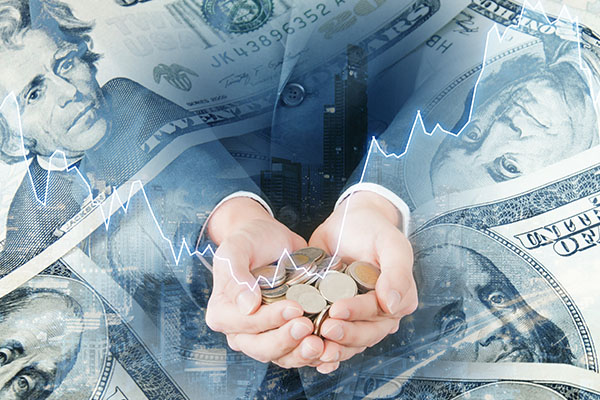
Personal Finance: If things hit the fan, silver will be a dependable and accepting medium of exchange.
Those are four emergency funds that I have. You definitely want to have about six months’ worth of expenses combined through all four of those types of emergency funds. It doesn’t matter whether it’s cash, cash in the bank, cash greenbacks in your safe. I think you should have both then, and cash value whole life policy or HELOC. If all of that is up to six months’ worth of expenses, then you are in a pretty good position should anything major get disrupted with your income.
Rapid-fire automation. Should you do it? Absolutely. You should have things automated in your finances. To me, the most important are the big three. You want to have your taxes, savings and your charitable giving automated. My emotions swing month to month. Sometimes I don’t feel like, “I’m not in the charitable mood. The kids can go get a job.” It’s what I’m thinking sometimes. I don’t want to support anybody. I want to support me. That’s happening. We’re human. Our emotions and generosity swing, but having these three set on autopilot where they’re automatically swept out every month keeps me on track with my plan.
My taxes go get paid monthly. You don’t want to overpay on your taxes otherwise the government has your money for free for most of the year. If you’re getting a tax refund at the end of the year, that means you paid too much to the government. We want to try to avoid that because we want our money with us working for us being put to fruitful measure. All of my savings are pretty much done into my whole life cash value insurance policy. That way I’m at least getting some level of return. I figured out, it is 5.5% in my policy. That’s the after-tax value. That’s not bad. That’s automated every single month without fail.
The third thing is our charity. We believe strongly in charity. Our main charity is to our church. That’s fundamentally what we want to support, believe in and have made a huge difference in our lives supporting the place that spiritually nourishes us. Whatever that charity is to you, it doesn’t have to be that, and I’m not telling you that’s what it needs to be, but I think a level of charitable giving where you put it on autopilot every month is very important. We have $100 a month going out to the Young Life program.
This is a great program to empower high school kids and give them a sense of community and support. We signed up for automation so that they get their $100 a month every month and that’s great for them. It helps them to forecast their cashflow. It helps us to stay on track with our giving with that organization.
Certainly, the most important thing you can do on debt pay down is to be attacking any all high-interest consumer debt. This is important. I cannot reiterate this enough. You certainly should not be investing until you pay down your high-interest consumer debt like credit card debt or you’ve got an auto loan that’s super high. You’ve got to get an attack and get that out of your life. Please think about it. Let’s see if something for 10% or 15% even and you pay that down. That’s an automatic 10% on your money.
I wouldn’t be trying to go out and buy any other asset when you have that liability hanging over you because you’re not going to be able to outpace that with your investments all that easy. Should you buy or lease a car? This one, I don’t have a strong opinion on. I don’t care either way what I’m most concerned on in either situation is how big or expensive of a car did you buy? I’m a huge proponent when you’re starting off in your wealth-building journey to buy a nice quality used foreign car, or it doesn’t have to be foreign, but I’ve had good luck. I bought a used Mercedes-Benz. Some of those run until they’re like 300,000-plus miles. You can get out of them.
They hold their value. Most of the depreciation on a car happens in the first three years. Getting a car around year three and you’re picking it up where so much of the value of the car has been lost. Your depreciation from there will absolutely slow down. Depreciation means the loss of value on the asset. The hitting cost of owning a car is the loss of value of that car as you dry that. Buying an expensive used or new car when you’re getting started, trying to build wealth.
You’re not investing, building for your future or buying cashflow-producing assets. You’re buying expensive liabilities, you got to rethink your plan here. Let’s not try to keep up with the Joneses. The Joneses are broke. You don’t want to be broke. You want to be rich and wealthy and have cashflow coming in, whether you’re working or not. You got to do some of these smart financial moves in the beginning in order to get to the point where you have the ability to create an incredible investment portfolio.
Don’t try to keep up with the Joneses. The Joneses are broke. You don't want to be broke. You want to be wealthy and have cash flow, whether you're working or not. Share on XThere are a lot of hidden fees that you guys are not aware of, but the main one is if you have any investment account, those 1% or 2% if you’re in a mutual fund, some of those are like 2% and that extra percent adds up. You got to be watching and understanding what fees you’re paying inside of your investment or banking accounts. Look at where you’d be charged a monthly fee service fee for your banking account. Are you paying late fees and interest fees on your credit cards because you miss your payments? Those things all rack up. You got to be watching any of those unnecessary fees that you’re paying that could be draining your future.
Creating this drag on your finances means you have to earn that much more to overcompensate. What I also love about credit cards is the cashback rewards. I get several thousand dollars back. I think it’s $5,000 or $6,000 just on credit card cash back rewards because we use it for our businesses. The amount of spending and that little cash back adds up. That creates some nice cash-back awards that we’re able to use. Extra stream of income for using credit cards. Consider all that.
These are some basic finance. If you have additional finance or personal finance type of questions, hit me up. I’ll definitely include them in the platform. I’ll answer on the next episode. I’ll do a Q&A, but don’t hesitate to reach out with questions. I want to hear what’s on your mind, your obstacles and challenges. Let me know. I’ll be able to serve you more effectively. Have a great day. Hopefully, this helps clear some things up on the personal finance game.
I look forward to interacting with all of you throughout the various platforms. You can find me on TikTok and Facebook. I’ve got a line too that you can text me. It’s 269-247-2881. That’s a dedicated line for Indestructible Wealth. Fire away. If you have something itchy and you wake up at 3:00 and you are like, “Indestructible Wealth is on my mind. I’ve got to ask you a question.” Fire away, it’s not by me at all. You are not going to wake me up. I look forward to your questions and serving you. Have a great day.
Important Links
- Rachel Marshall – Past Episode
- Indestructible Wealth – Facebook


